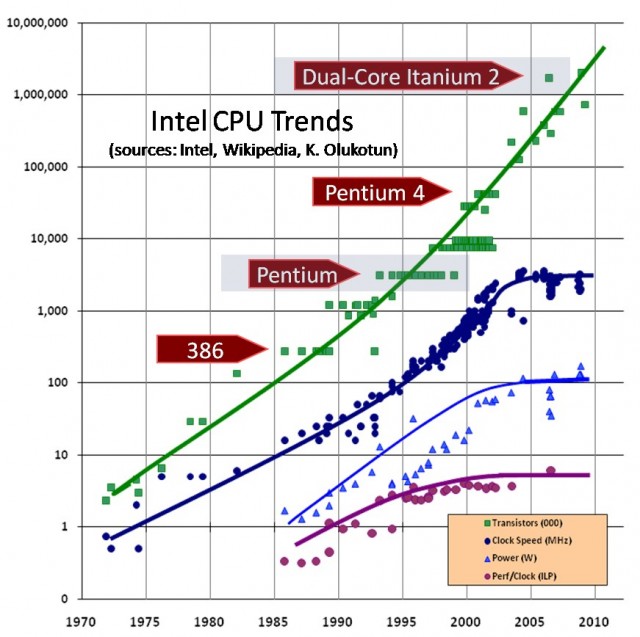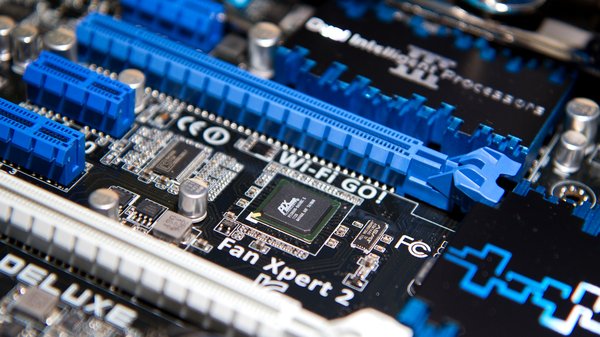
The tech geek used to be so excited that more and more people were using computers. The isolation was fading, and we were even starting to feel a little bit cool. In time, though, the Average Joe has actually gotten in the way.
The surging demand for computer hardware by inexperienced users is flooding the industry with lowest common denominator machines and making it tougher for more skilled users to find computers that meet their needs. Too many retailers feature equipment for the middle of the road instead of the cutting edge.
Consider some of the key areas where your ability to get high level equipment intersects with the thriving world of uploading kitty videos.
Processor Speed

The death of CPU scaling: From one core to many — and why we’re still stuck
The breakneck advances from 286 through Pentium and beyond have long since outrun ordinary consumers. Speeds today far exceed what ordinary word processing and web surfing will require. Gaming, video creation, and heavy commercial applications are a different story, and users in search of hardware for these situations need to find vendors who understand the difference in needs between an industrial board and one used for home applications.
The challenge is to find sources that can distinguish between outrageous processor speeds and ludicrous ones. Those people are getting more scarce all the time because speeds have gotten so far ahead of what routine consumers use. Processor speed is no longer in the conversation for ordinary buyers, so high level purchasers can have a real headache finding people who even understand why they’re having a conversation about processors anyway. Verdict: Average Joe is hurting us.
Storage Space

Mobile Device Storage: How Much Do You (Really) Need?
Most people in the PC market don’t even know what a terabyte is, but much like trendy urban drivers thought 4×4 SUV’s were necessities, these consumers subscribe to the “more is better” philosophy and have bought enormous external hard drives. Massive libraries of photos, video, and music have helped feed this demand. And of course, memory is fairly easy to understand; the more stuff you want to save, the more memory you must have.
So to an extent, the acceptance of the importance of storage is helping the high-end PC user by driving the development and supply of larger storage technology. It’s immaterial whether the space is used for backing up family tree information or for schematics of new industrial equipment.
The emergence of the Cloud is likely to alter this. Leaked celebrity photos not withstanding, many users are so phone dependent that they must find a way to manage files without being chained to a laptop. In time, this trend could reduce demand for onsite storage. Verdict: Average Joe is helping us right now, but in the long term could hurt us.
Bus Speed and Type

Theoretical vs. Actual Bandwidth: PCI Express and Thunderbolt
It’s pretty much de rigueur to see a couple of USB’s, an RGB, and the occasional 1394 on most cookie cutter computers. But presence alone isn’t the key issue. For heavy use, the speed of the bus is critical. This permits realtime action in games, video, and import of data for drafting and design applications.
Most machines have sold just fine with cheap, slow ports. They were sufficient for a quick offload from a digital camcorder. Fortunately, those devices are fading as well. Most users now capture video via smartphones or tablets, and if they choose to edit or burn the videos, they often just upload to the Cloud or social media and then retrieve from the desktop or laptop for editing. In time, highend use will recapture enough of the market share that it will become easier to specify better speeds. Verdict: Average Joe will soon get out of our way.
The presence of workaday consumers in the hardware market has encouraged development of broadband networks and availability of many accessories. But their lower demands have made dummyproof systems too numerous, crowding out the serious user.
Certain aspects of this are set to improve, while others may get worse before they get better. The key is to find and support quality vendors to keep their products plentiful.




